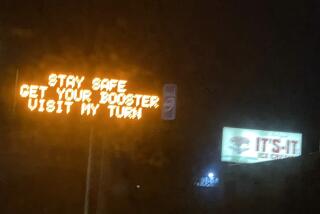A Boost for Beautification
The Highway Beautification Act was one of Lady Bird Johnson’s enduring contributions to this country, but after more than 30 years it is showing its age and needs touching up.
Passed by Congress in 1965 with much fanfare and the first lady’s active support, the act recognized that the nation’s highway building program, then underway, could inadvertently ruin the scenic countryside through which the new roads passed. The act called for highway landscaping and the screening of junkyards. It also set standards controlling the placement of billboards.
These all remain worthy goals, but the billboard standards have proven inadequate, largely because of legal loopholes and a lack of enforcement.
The act makes the flow of federal highway dollars conditional on rigorous state and local regulation of billboards. Amended several times in recent years, it bars construction of new billboards except in commercial or industrial zones; requires the removal of billboards whose placement or size violates state and local law, and calls for removal of billboards that were legal when they were erected but have been made illegal by later changes in state or local law.
In practice, however, the penalties for a state that fails to enforce its own billboard laws are so heavy-handed--loss of 10% of that state’s federal highway funding--that for decades the U.S. Department of Transportation has dared not intervene. As a result, billboards have proliferated in many states, blighting scenic highways. A key problem is that federal law requires communities to pay advertisers that are forced to remove illegal billboards but provides no funds to do so. Cities have an easier time getting illegal billboards off city streets.
A rewrite of the Highway Beautification Act seems in order, and the approach embodied in a bill now before the Senate Finance Committee could help. Sponsored by Sen. James M. Jeffords (R-Vt.) and supported by the U.S. Conference of Mayors, the bill would close some loopholes and halt proliferation of billboards along open stretches of highway. It would also forbid the practice of felling trees on public property to enhance the visibility of billboards on private property. Significantly, it would provide funding to make state enforcement of state laws meaningful.
Billboards and rural serenity may well be incompatible. The signs are meant to distract, designed to be in-your-face alternatives to the seamless passing countryside. Federal regulation won’t resolve this contradiction but it could remove the worst offenders.
More to Read
Sign up for Essential California
The most important California stories and recommendations in your inbox every morning.
You may occasionally receive promotional content from the Los Angeles Times.










